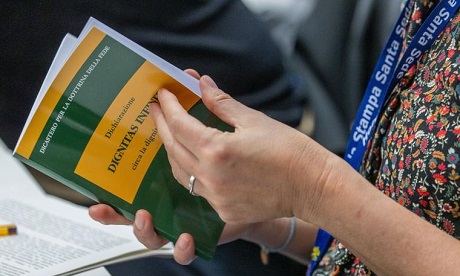For over a decade, LGBTQ Catholics have grappled with the pope’s views on LGBTQ Catholics.
The have grappled with what it means to balance having a pope who literally and figuratively embraces their community while approving documents that seem to call their very dignity into question.
That reality is playing out again today, with the release of the Vatican declaration “Dignitas Infinita,”.
Dignitas Infinita is a 12,000-word treatise articulating previous church teaching on a number of issues related to human dignity.
Many Vatican analysts point out that rather than presenting new teaching, “Dignitas Infinita” more or less summarises existing Church doctrine.
It touches on a number of issues related to human dignity, including war, poverty, sex abuse and human trafficking.
The document, which has been in the works for the past five years, cites other popes and Vatican documents.
It also tries to synthesise the thoughts of Pope Francis.
The whiplash striking LGBTQ Catholics
The whiplash that accompanies being a Catholic and member of the LGBTQ community today is present even within this single document.
That’s because the sections that touch most closely on LGBTQ issues actually include a couple of bright spots – before offering strong condemnations of “gender theory” and “sex change” surgeries.
What does the new declaration say?
First, “Dignitas Infinita“ reiterates church teaching that:
“every person, regardless of sexual orientation, ought to be respected in his or her dignity and treated with consideration, while ‘every sign of unjust discrimination’ is to be carefully avoided, particularly any form of aggression and violence.”
Then it goes a step further, condemning laws that criminalise homosexuality, stating:
“it should be denounced as contrary to human dignity the fact that, in some places, not a few people are imprisoned, tortured, and even deprived of the good of life solely because of their sexual orientation.”
For years, LGBTQ activists had urged Pope Francis to speak out against laws that criminalise homosexuality, particularly statutes and bills in some African countries that had the support of local bishops.
Francis took this step last year, becoming the first pope to condemn laws in at least 67 countries that criminalise homosexuality.
Now the Dicastery for the Doctrine of the Faith has further bolstered the notion that Catholics should not support these kinds of prohibitions.
At a press conference following the release of the document, Cardinal Víctor Fernández, the prefect of the Dicastery for the Doctrine of the Faith, described it as “painful” to learn that some Catholics support laws criminalising homosexuality.
He said “we do not agree with criminalisation.”
James Martin, S.J., the founder of Outreach, said in a statement that he is “grateful that the Vatican has reiterated its official condemnation of every kind of violence against LGBTQ people, including imprisonment and execution.
“That cannot be repeated too often as an offense against human dignity.
“The LGBTQ person, like everyone else, has infinite dignity.”
The document is also notable for what it doesn’t contain.
These are, namely, some of the harsher language present in an earlier Vatican document about gender identity – even some of the phrases spoken by Pope Francis himself around this topic.
But those omissions will probably offer little comfort to the transgender Catholic community and their families and allies, who will undoubtedly be hurt by what is included. Read more
- Michael J. O’Loughlin is a journalist, author, commentator, and speaker who covers religion and politics with a particular focus on the Catholic Church. He is the executive director of Outreach, an LGBTQ Catholic resource.
